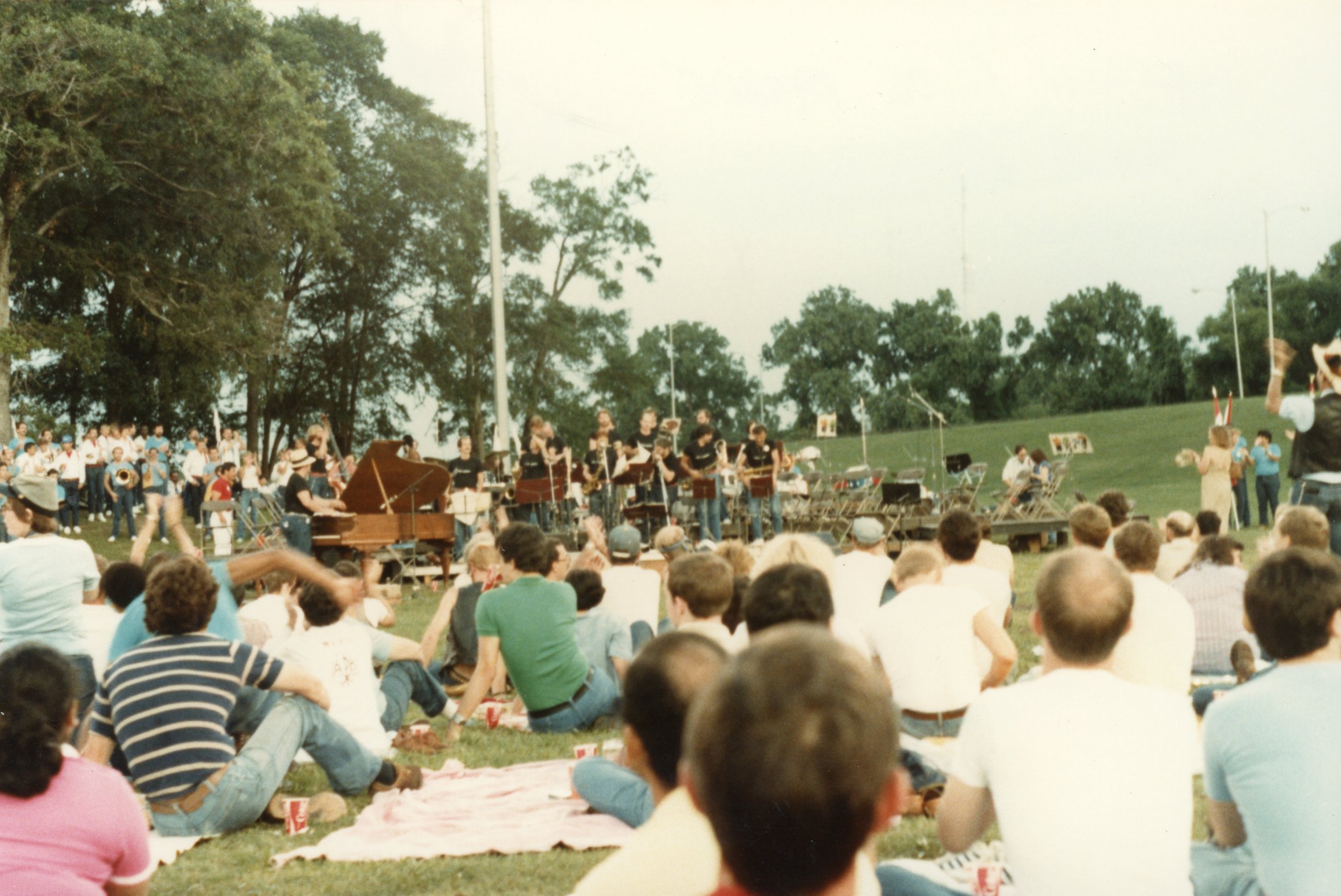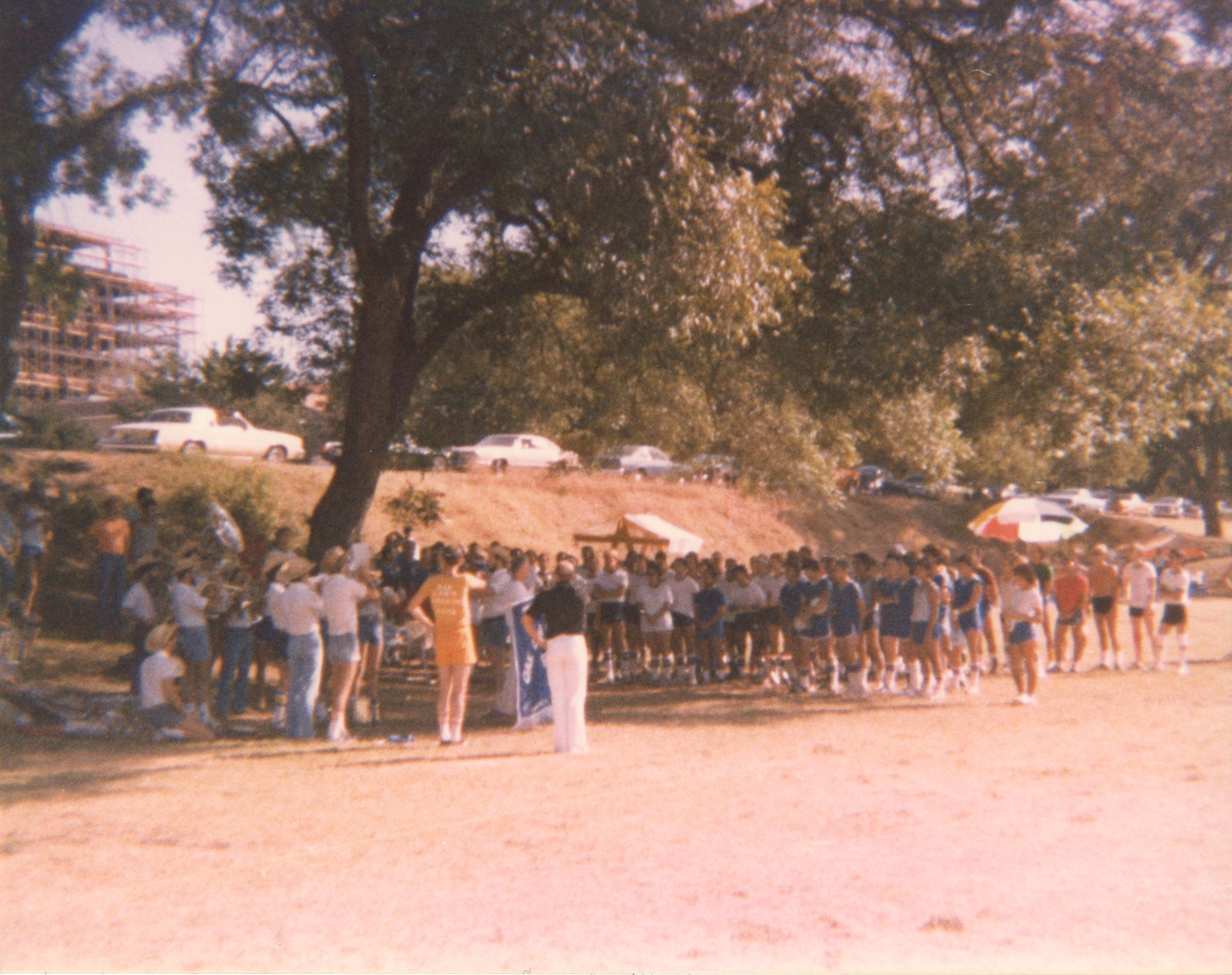Let's Hear from Oak Lawn Band Members!
Let's Hear from Oak Lawn Band Members!
Thanks to OLB Team Flashback: Aaron Chavez, Cheryl Clark, Michael Jones, Ellen Kaner, George Krieger, Jamie Rawson, Suzy Smith, Tommy Suttlehan, Mason Tripp, & Carol Young!
1980
The Oak Lawn Band Official History
The Oak Lawn Band has served Dallas and its gay community from its inception in the summer of 1980 until the present day and is a founding member band of the Lesbian and Gay Bands of America (LGBA). During its 45+ year history, the Oak Lawn Band (OLB) has been involved with many of the major performing arts groups in Dallas. These groups include other organizations serving the Gay, Lesbian, Bisexual, and Transgender (GLBT) community and other organizations from the greater Dallas/Fort Worth metropolitan area. The Oak Lawn Band originally formed as a marching band but quickly added a symphonic band as well. Although the symphonic band became more prominent, the OLB continues to march in Dallas's annual Texas Freedom Parade, and the pep band performs at many other local events. The Oak Lawn Band has a concert season that runs from September through June, doing three or four main concerts, a fundraiser for the community ‘Concert in the Park,’ and does various other gigs with smaller groups within the band, such as Christmas Caroling.
In June of 1980, six gay men sat discussing the upcoming Dallas Pride Parade. At that time the Pride Parade in Dallas was in its infancy, and the mere fact that the city even held a Pride Parade was considered fairly bold and daring. Though Dallas had seen its very first Pride Parade in 1972, just three years after the Stonewall Riots, the parade in 1980 was only the second occurrence of the event. In many ways the 1980 parade was the first significant pride event in Dallas, attracting many participant organizations and major media attention. Those six friends who discussed the parade all agreed that the parade would need a good, Gay marching band to create the proper festive atmosphere. It was decided to “start the ball rolling.” Signs were created, posters posted, and the first rehearsal was announced. The initial instrumentation was somewhat variable, and perhaps even a bit eccentric for a traditional street marching band, but after a few rehearsals, a true band began to take shape. Rehearsals concentrated on fairly familiar music and street marching. Baton artist Michael Jones recalls that when Drum Major/Director Steve Boykin called a halt during an early rehearsal, the baritone player next to him said, “Man, I haven't played this since high school and I can still do it!” By the time the parade day arrived, the Oak Lawn Band had 40 players, eight flag performers, four featured baton twirlers, and two banner carriers. When the band made its stop before the reviewing stands where the parade's Grand Marshall was seated, she commented, “Y'all are the hottest thing here!” After the parade and celebration wrapped up, the many positive comments and enthusiastic appreciations expressed by those who attended the festivities made it clear that Dallas needed a band. The band's mission almost immediately expanded beyond its ad hoc creation for the parade, and the Oak Lawn Symphonic Band was born.
1981
A formal organization was created, with Steve Boykin serving as artistic director. Mike Cole served as the band's first president. Roger Daigle served as Vice President, Michael Champion as Secretary, and Dennis Case as Treasurer. These first officers served rather brief, three-month executive terms, as the band was growing and adjusting to its new structure. During the band's first season, there was an ongoing effort to secure a regular, reliable, and adequate rehearsal space. The band utilized varied and unusual venues including office buildings and local bars. The band's first symphonic concert was performed on May 30, 1981 at El Centro College. Steve Boykin directed the performance and the program included traditional favorites such as Scott Joplin's The Entertainer and John Philip Sousa's Semper Fidelis . The program also featured Chesnekov's Salvation is Created, Claude Smith's Acclamation, Leonard Bernstein's Highlights From West Side Story, and Nikolai Rimsky-Korsakov's Procession of the Nobles. It seems hard to imagine that the first tickets were priced at just $3.00! The concert was a success and well-attended. The Oak Lawn Band's second public performance established it as an asset to Dallas' GLBT community.
1981 also saw the Oak Lawn Band make its first “road trip” to travel to Houston for their Pride Parade. This was an exciting experience. Houston's Montrose Symphonic Band had also invited the band from Los Angeles, making for a truly memorable occasion. On the evening before the parade, the Houston band hosted a concert in a local park. The concert was a joint performance by each of the three bands and also included the choir from the local MCC church. In 1981, this aggregation of gay musicians was reckoned to be the largest such gathering to date. The parade itself was a great success. The three bands, totaling more than 130 performers, were perhaps the biggest hit of the parade. The patriotic parade theme was expressed in the attire issued to each band: hardhats featuring the parade logo - blue for Dallas, red for Houston, and white for Los Angeles. It was a fine and fitting conclusion to the Oak Lawn Band's first season.
1982
The following September, a new season commenced. The Oak Lawn Band performed a free public concert in Lee Park in Dallas (now Turtle Creek Park). A more formal concert setting, again at El Centro College, was chosen for the band's November concert. The Oak Lawn Band continued its involvement in the Dallas GLBT community throughout 1982. In April, the Oak Lawn Band appeared in a free joint concert with musicians from the Metropolitan Community Church of Dallas. One hallmark of the band's growth and success was the establishment of an account with local music store Brook Mays. In anticipation of the 1982 Dallas Pride Parade, the Oak Lawn Band formally established its Baton and Flag Corps. For the 1982 Dallas Pride Parade, the Oak Lawn Band hosted Houston's Montrose Band. The Houston band again invited the Oak Lawn Band to perform in Houston's parade the following week.
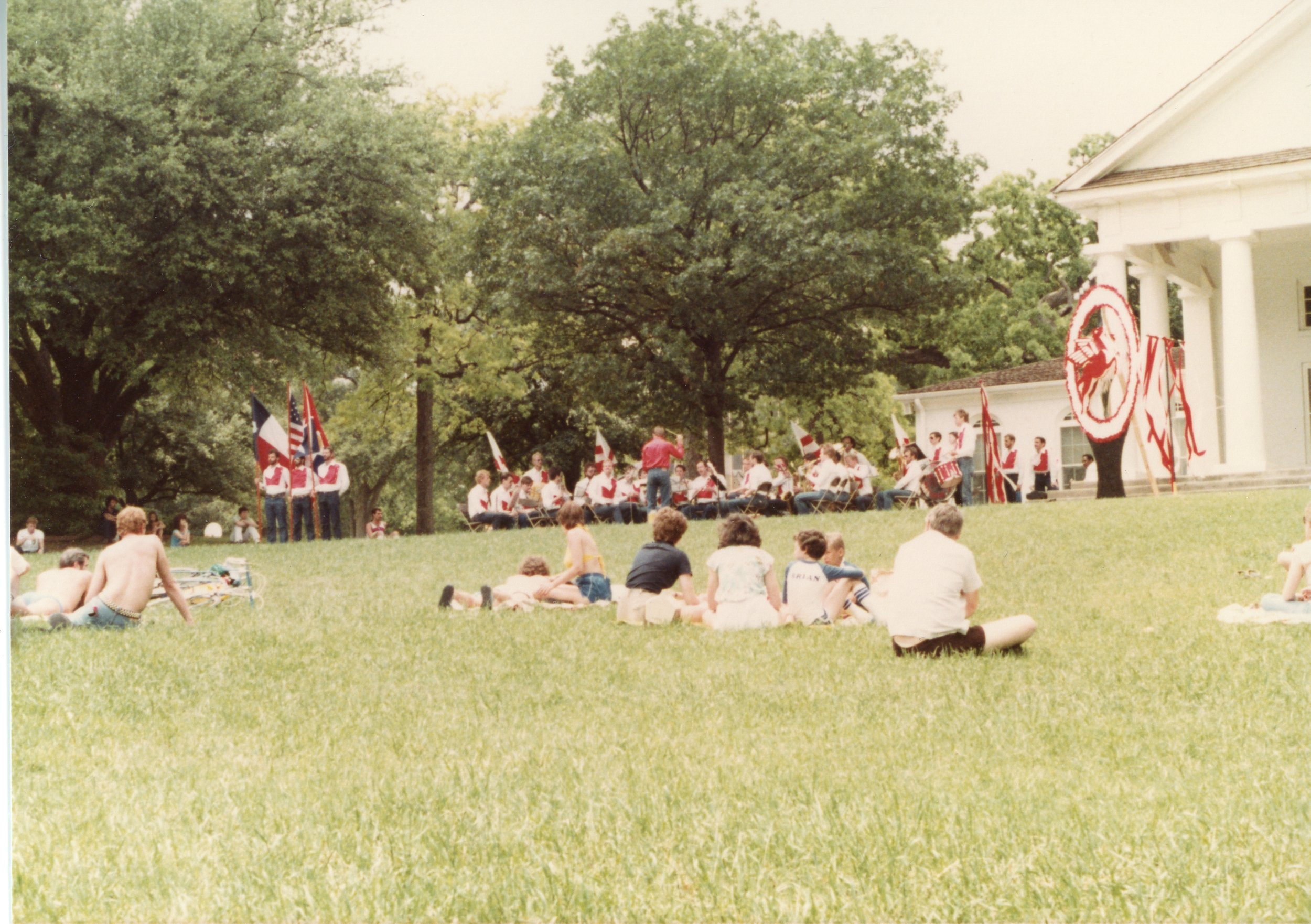
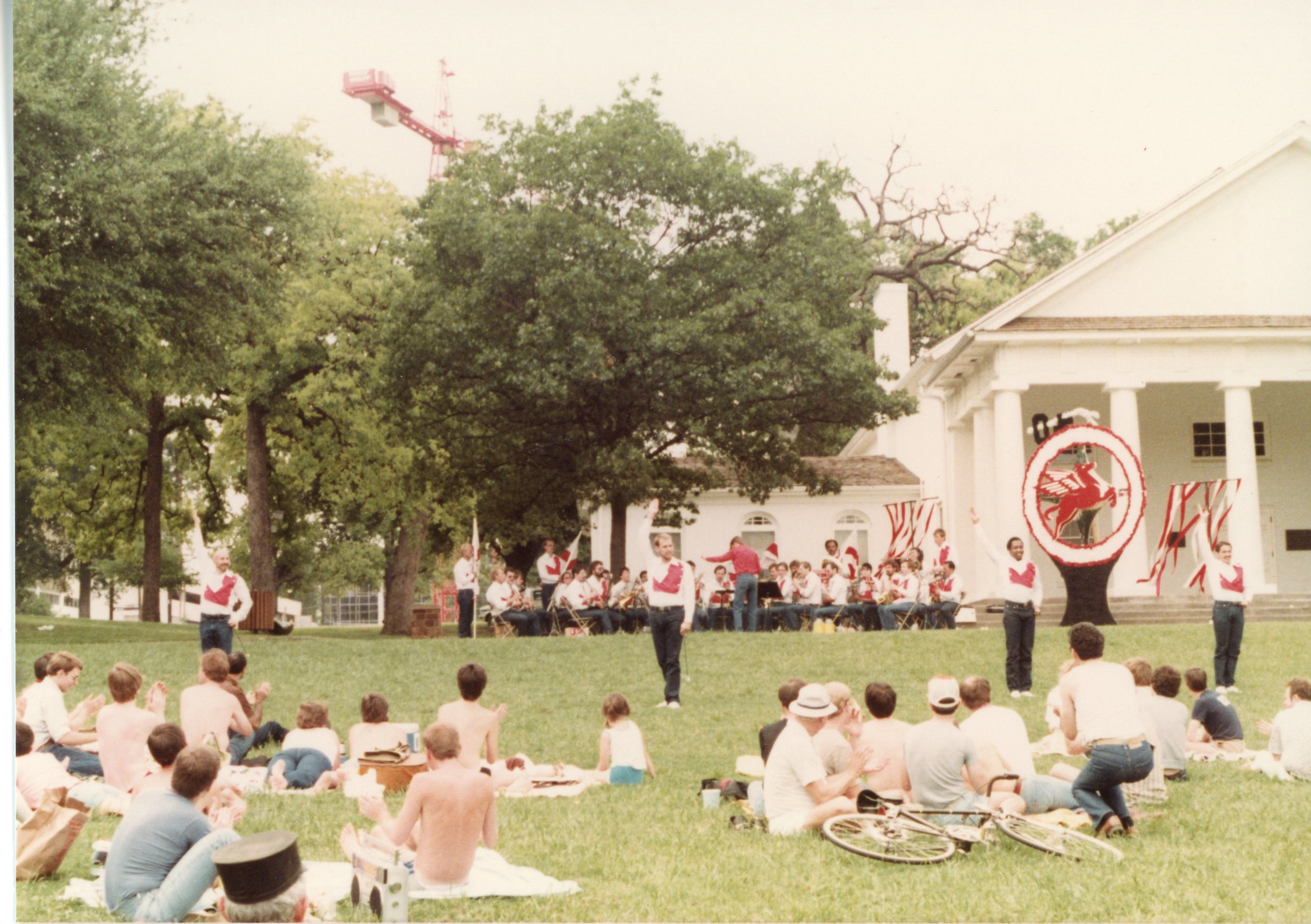
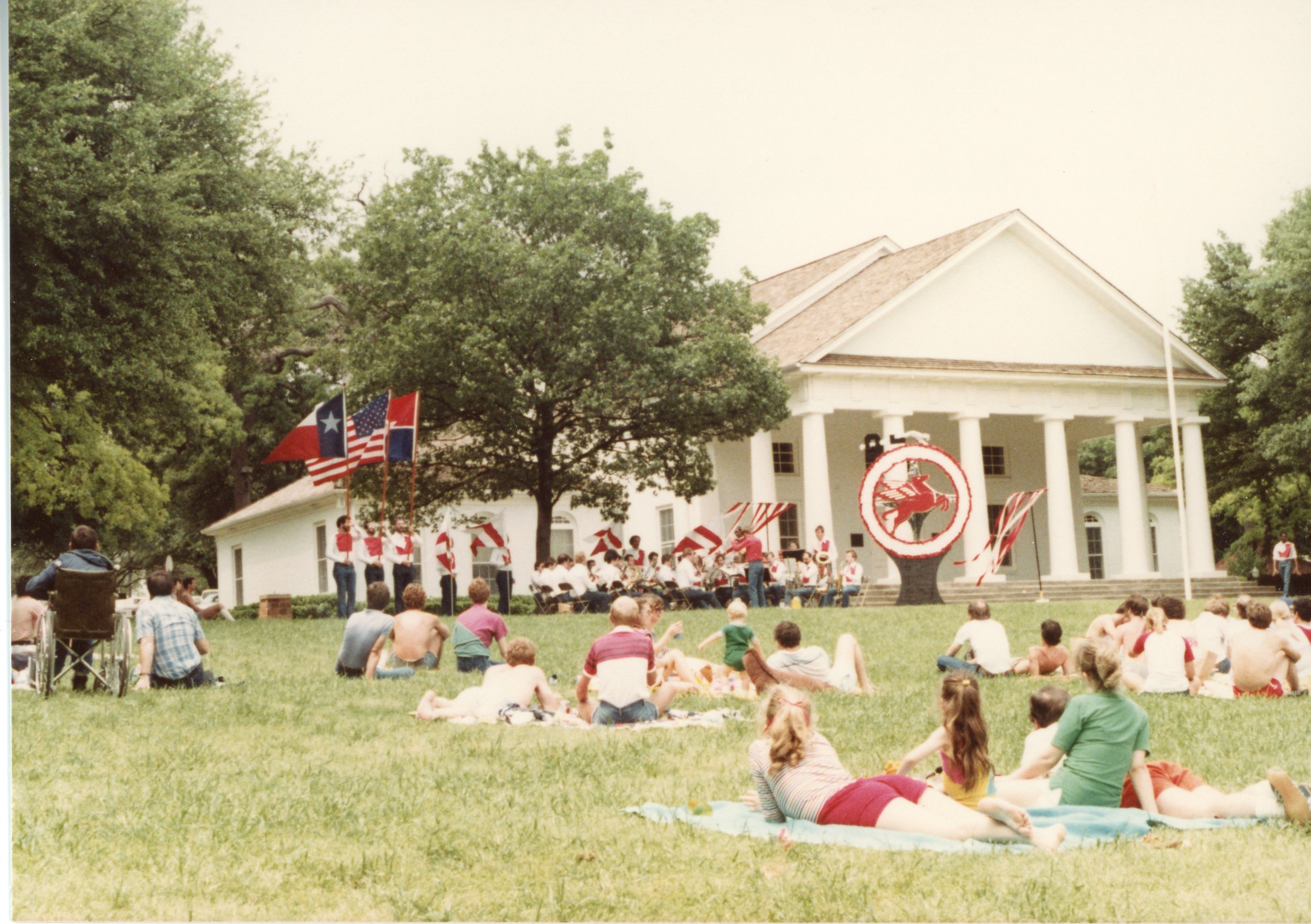
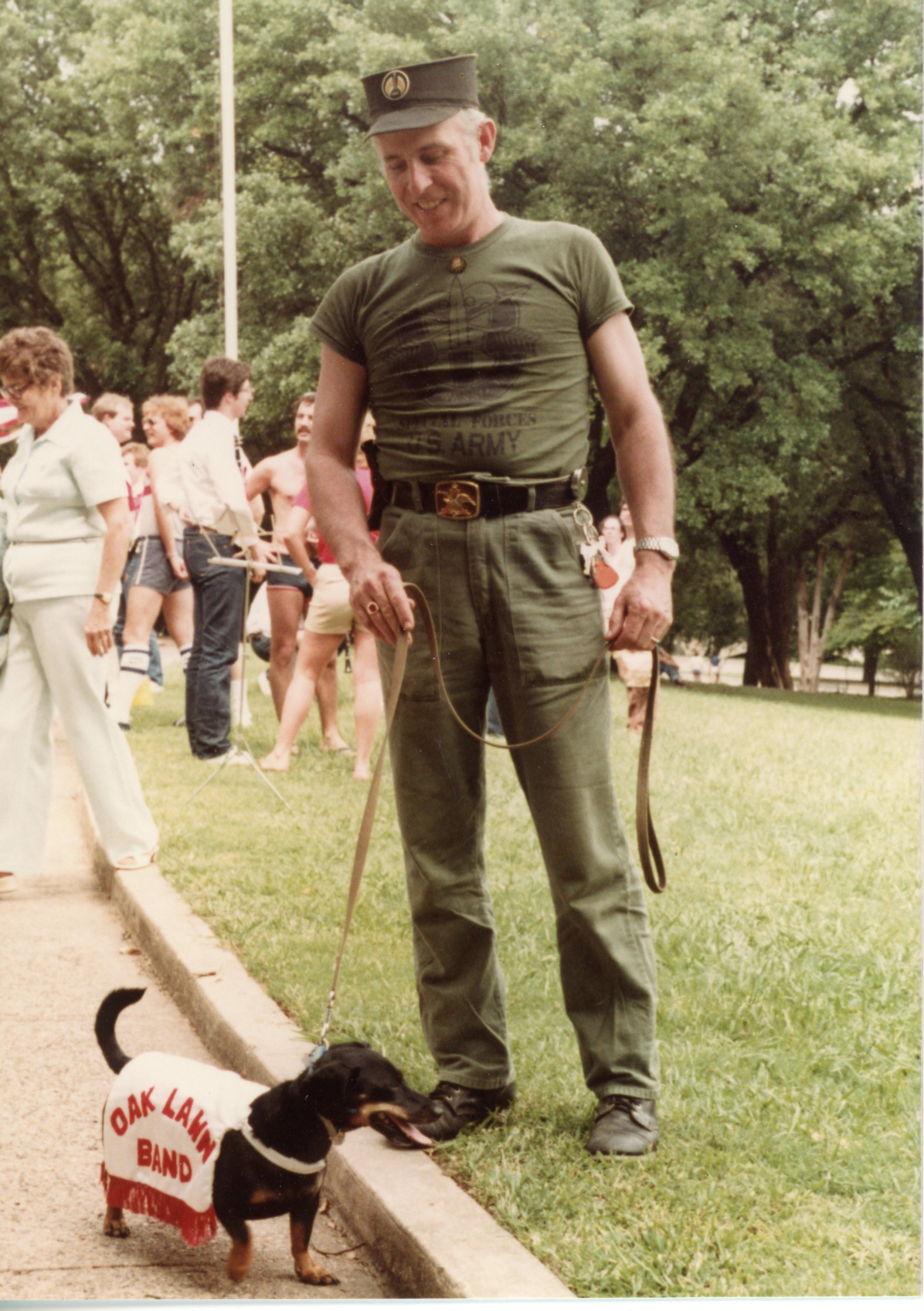
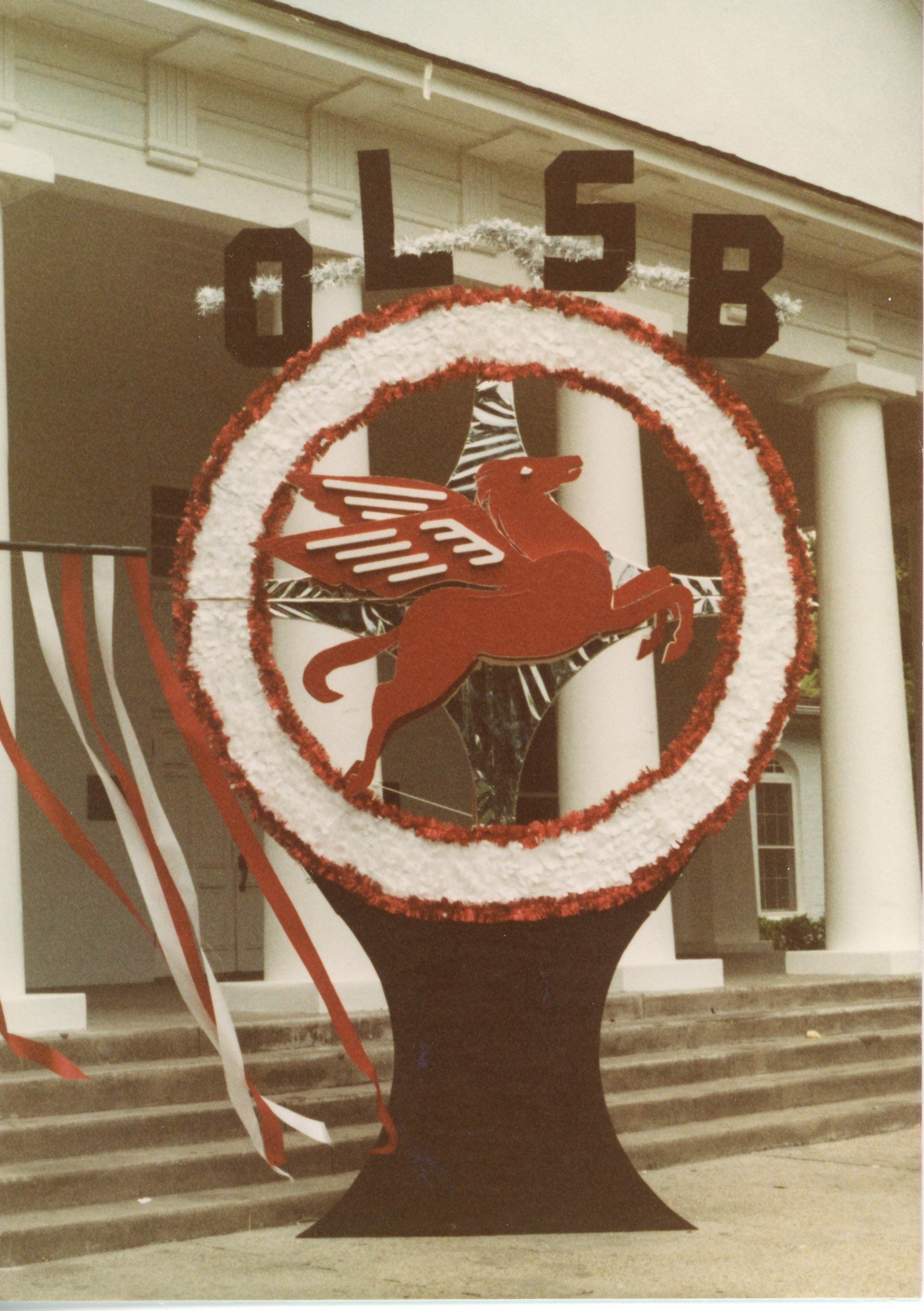
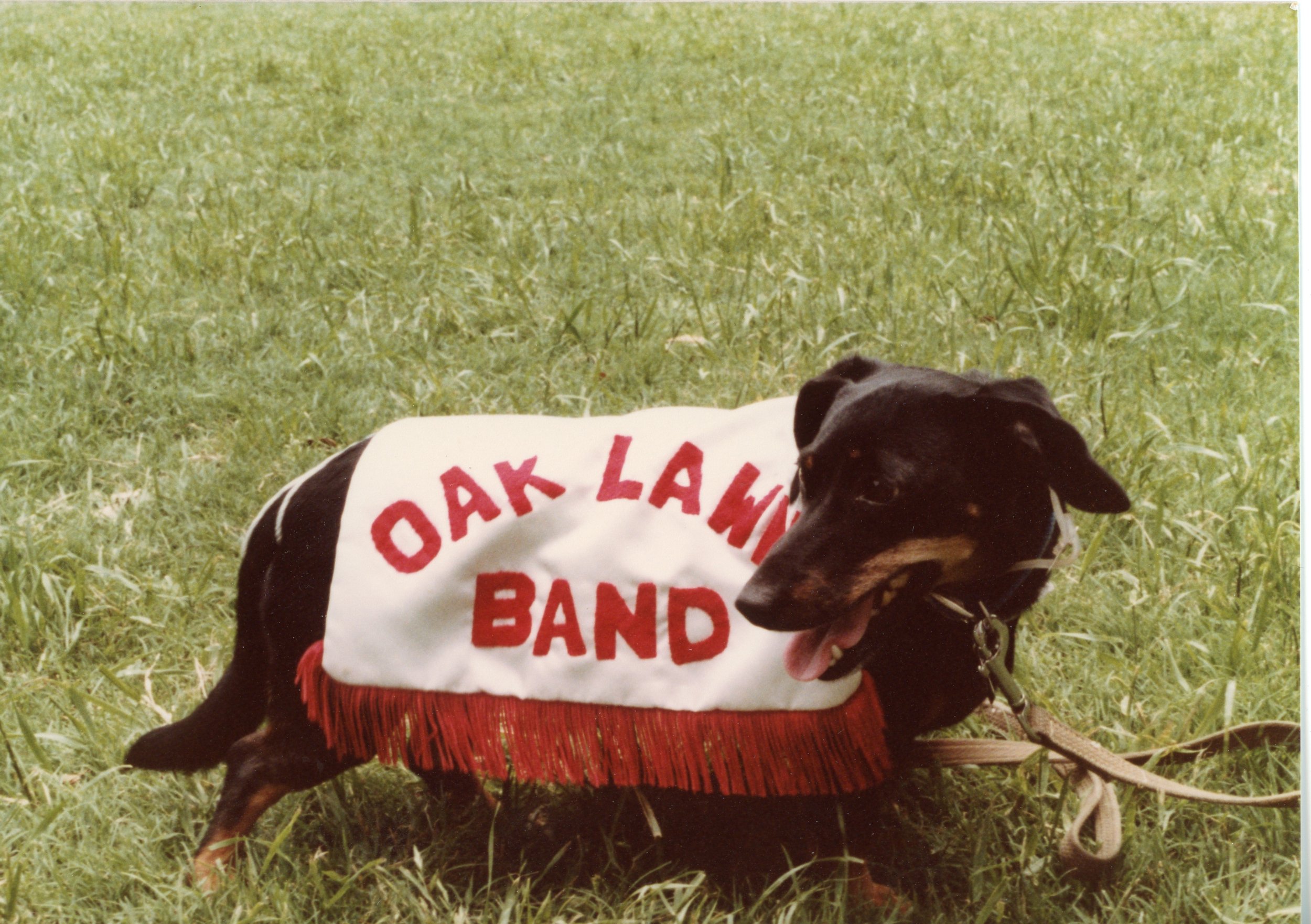

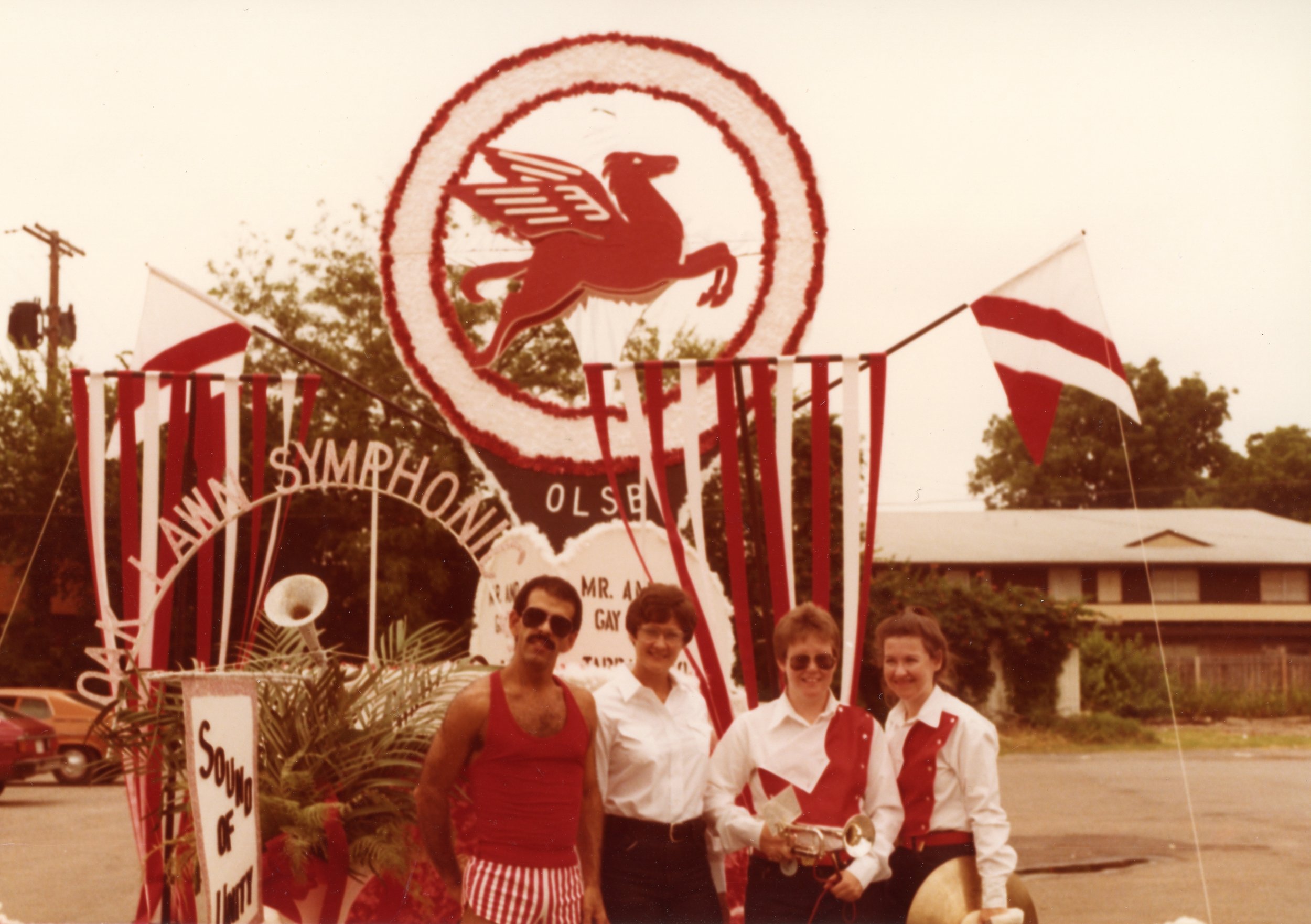
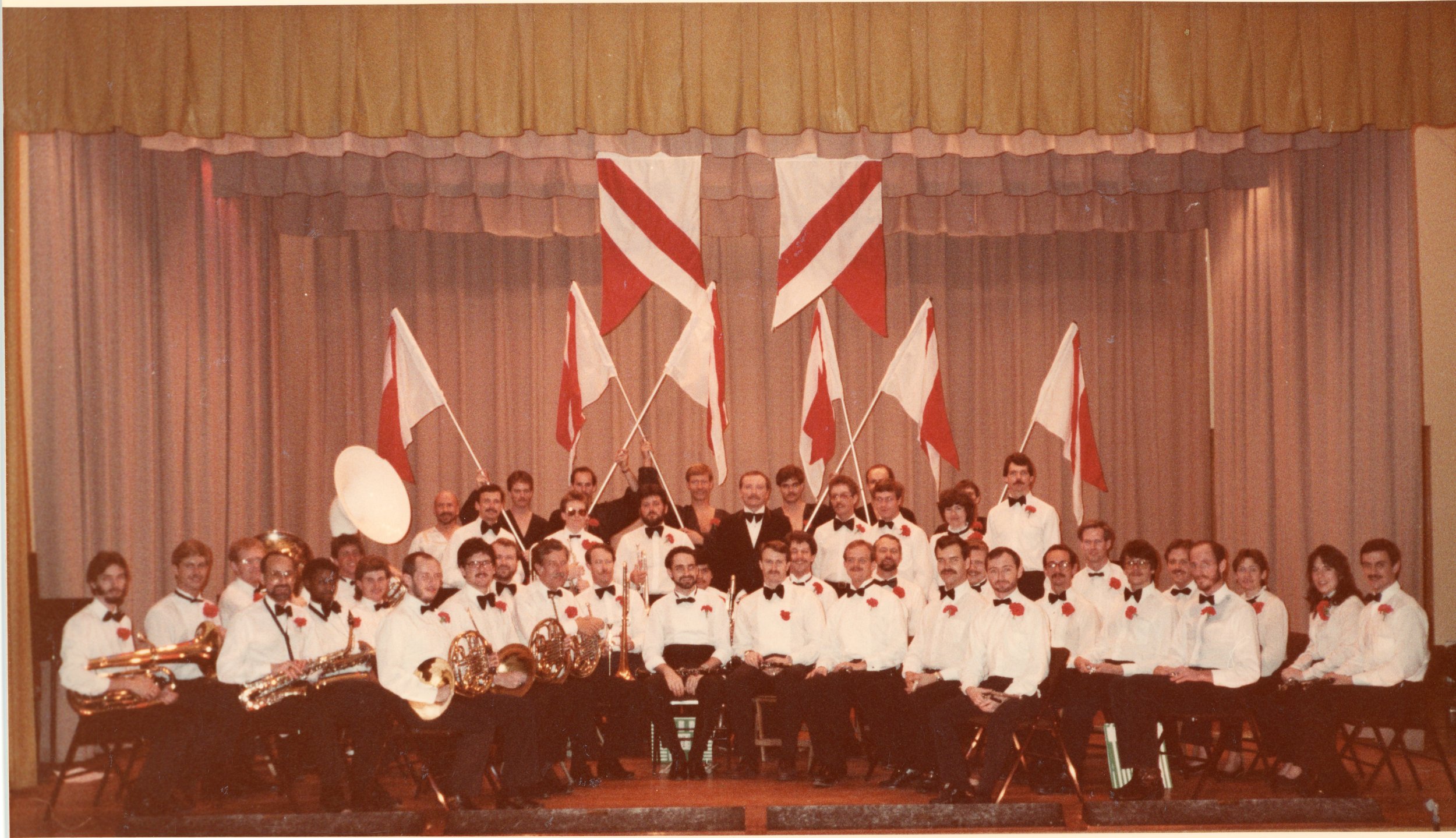

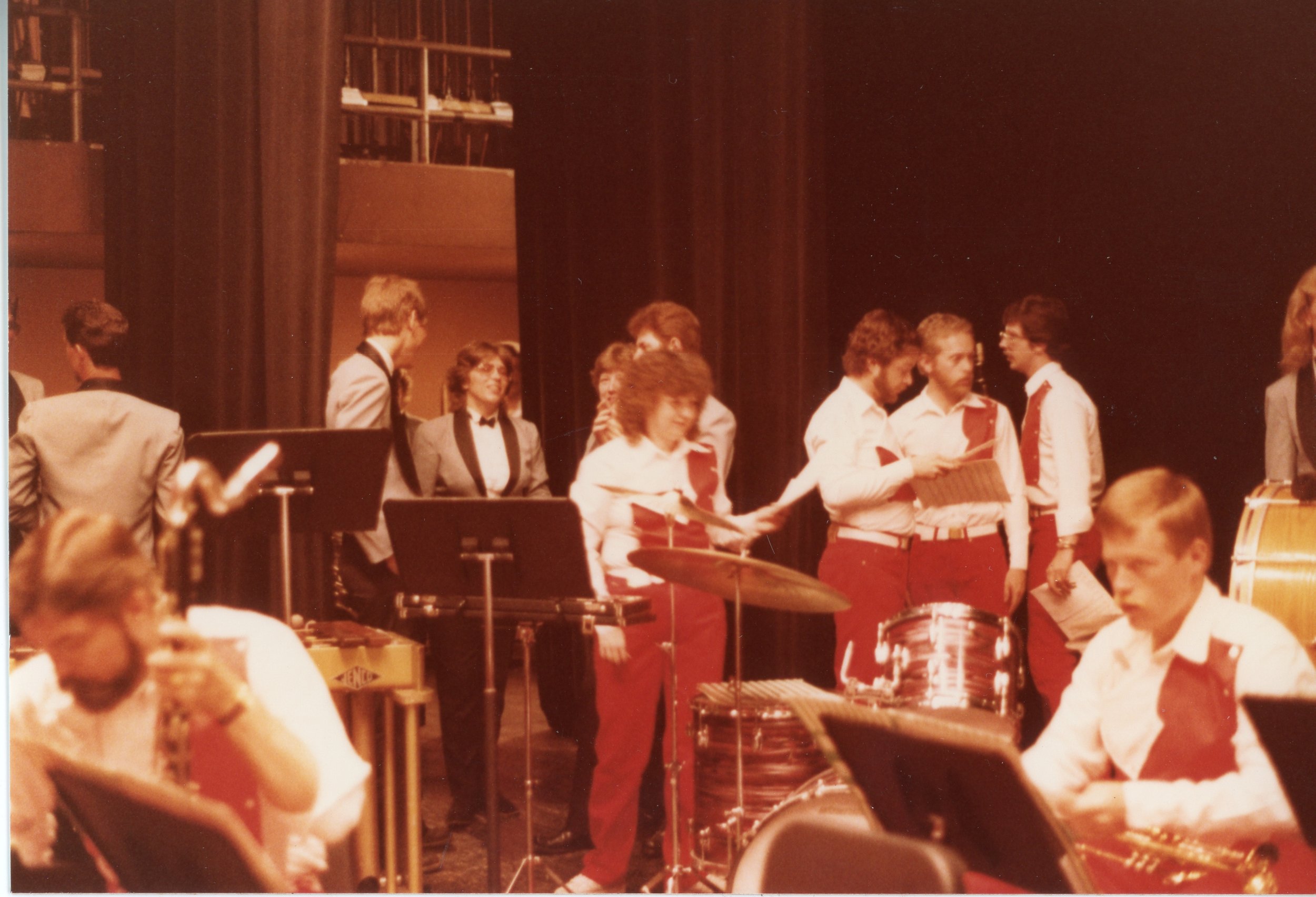
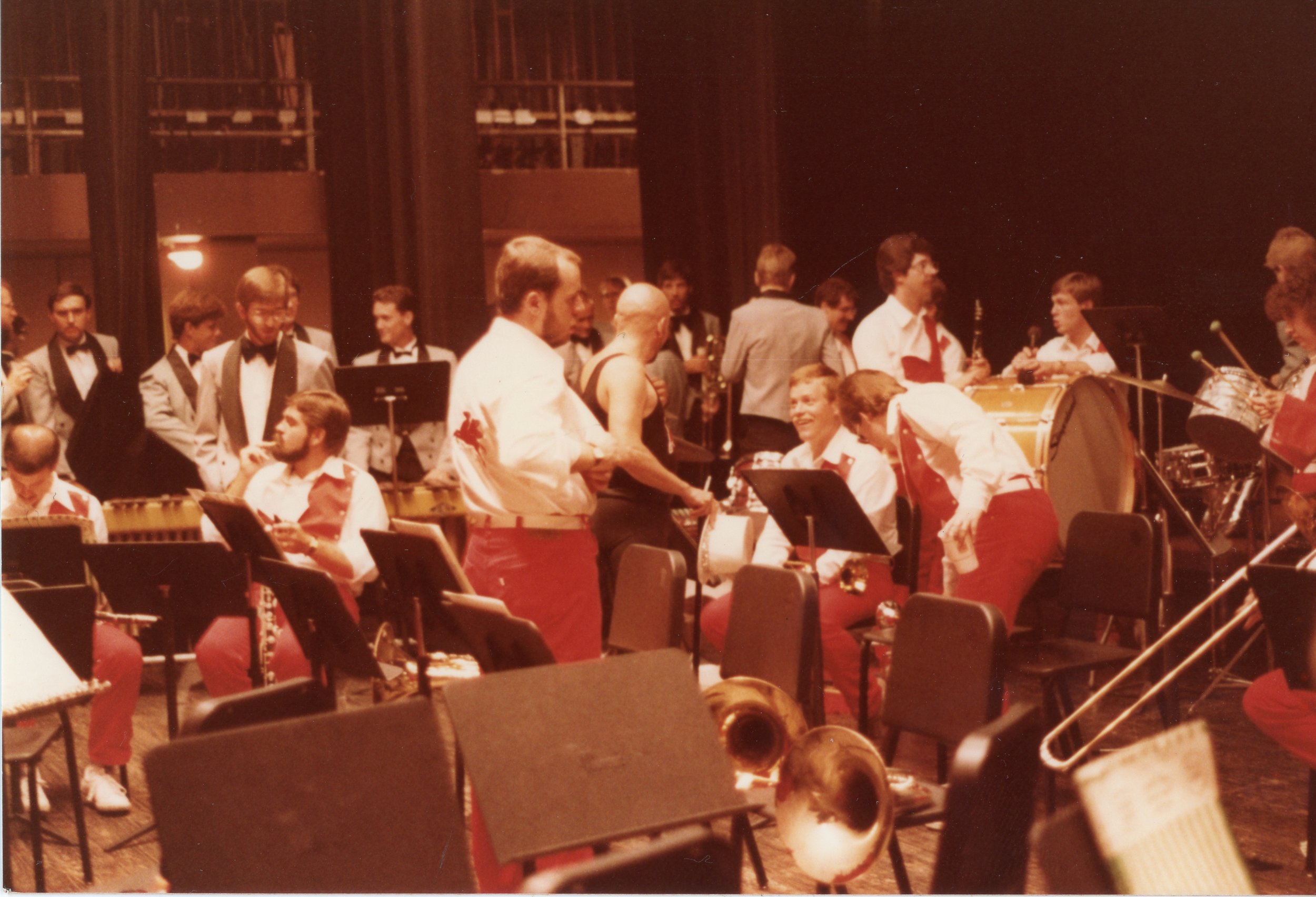

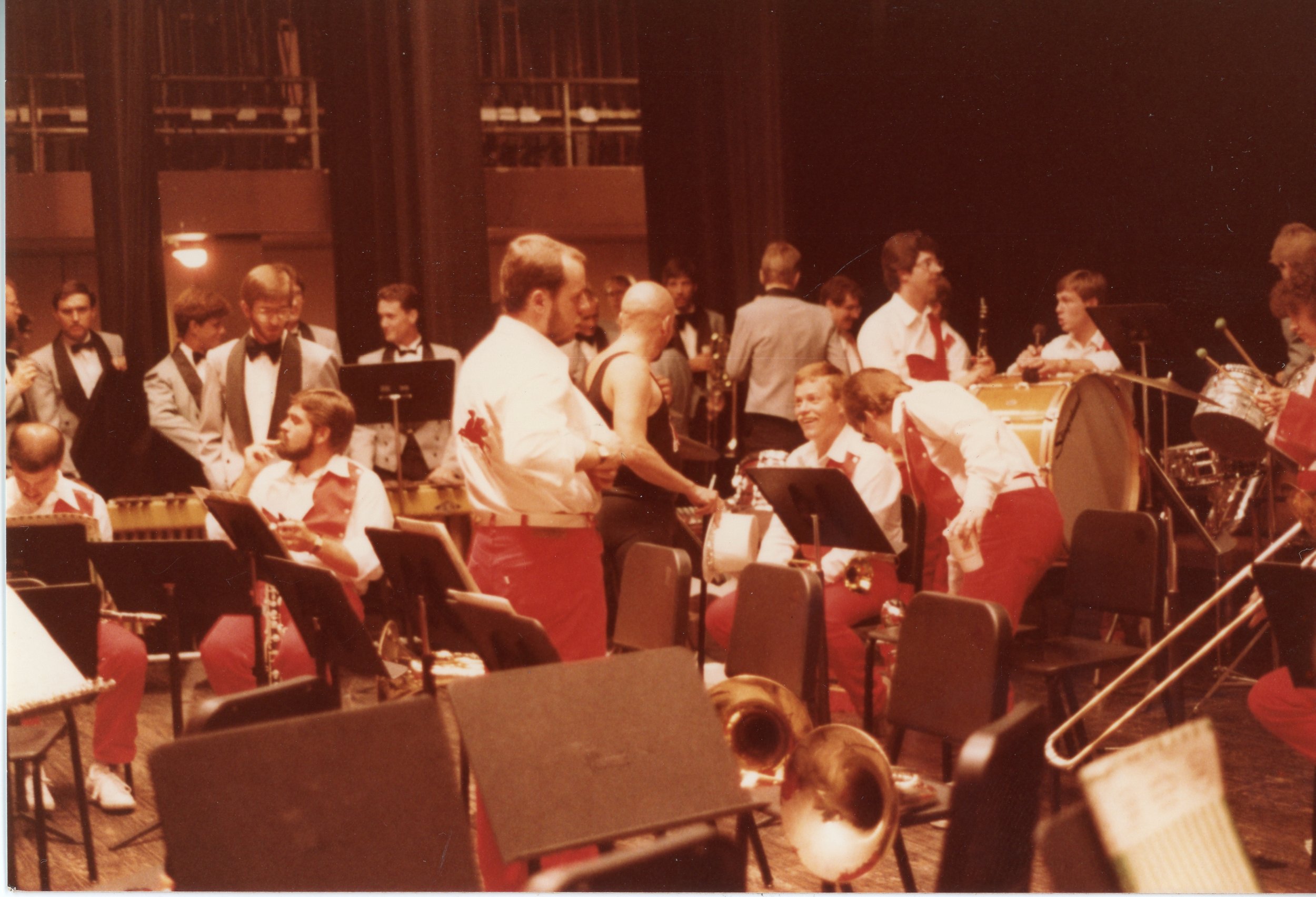
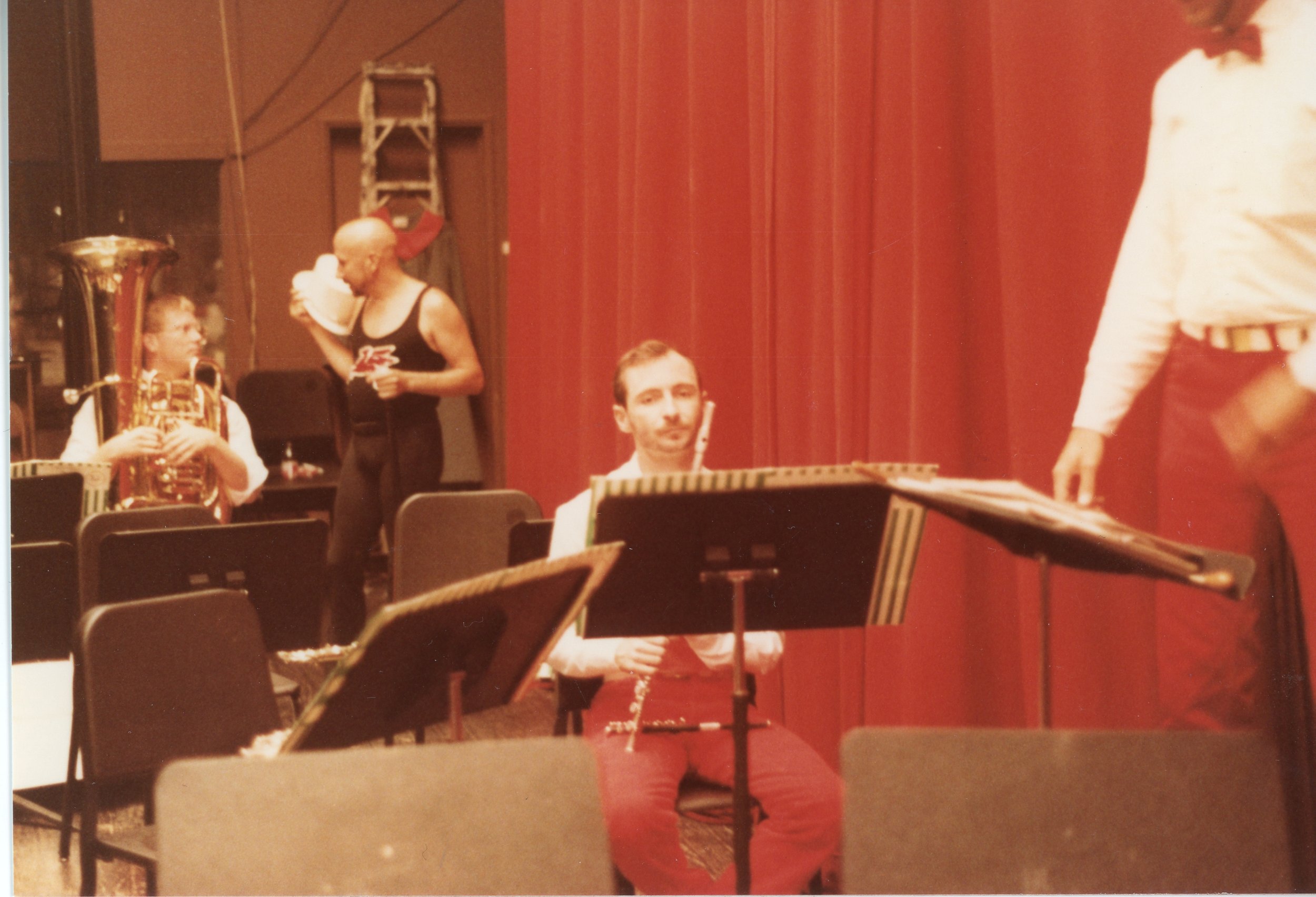
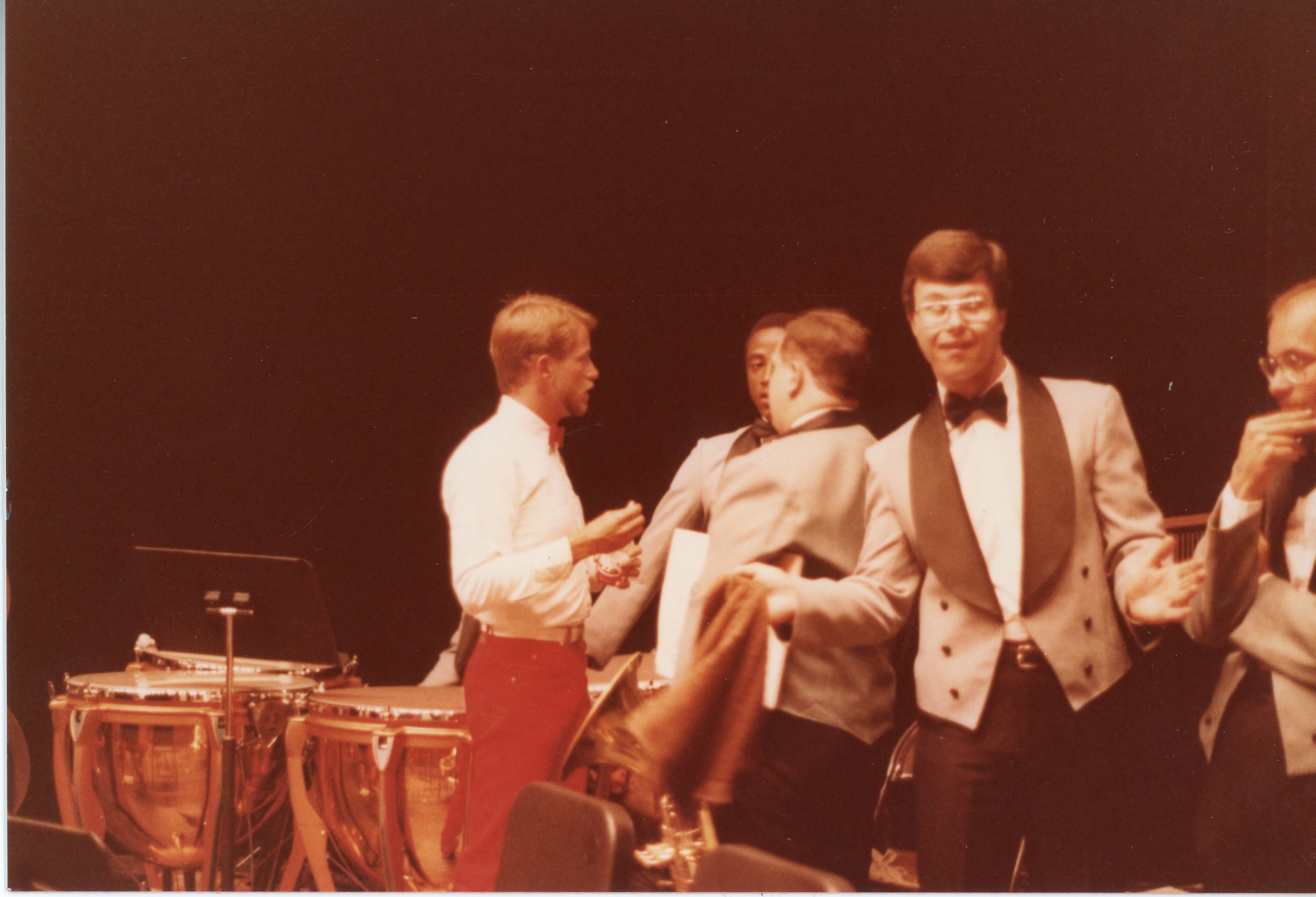
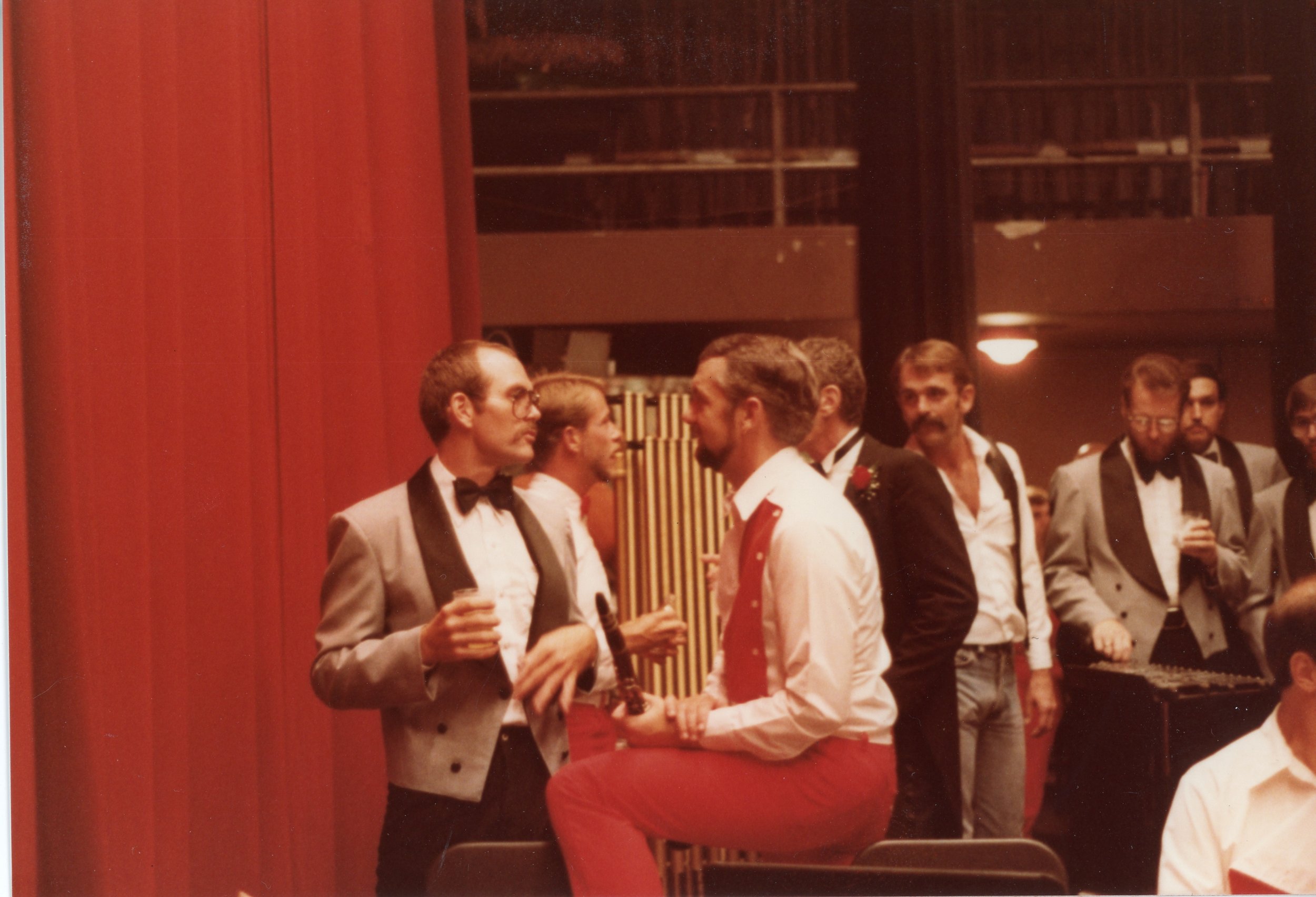
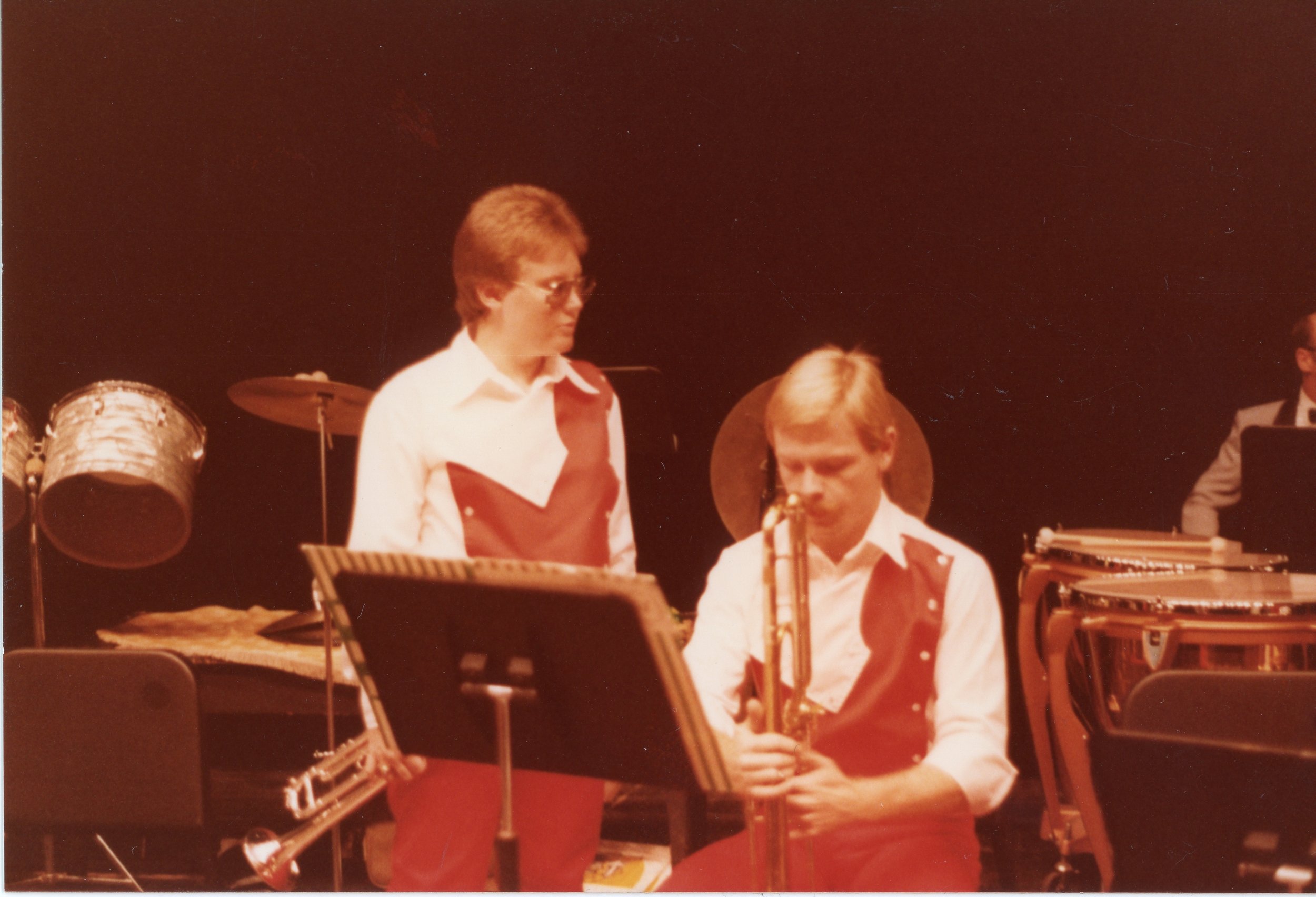
1983
The Oak Lawn Band experienced further growth in 1983, and several major milestones were achieved in the 1982-1983 season. The Oak Lawn Band moved to Dallas' MCC as its rehearsal home. Steve Boykin continued in his role as Artistic Director, and the band elected its first female president, Judith Atwood. An umbrella arts alliance was formed to support a variety of community arts organizations. The Greater Dallas Music Foundation included a women's choir, Dallas on Tap, and other smaller groups, as well as the Oak Lawn Band.
1984
The 1984 season was a time of changes in the band. John Hail assumed the post of Artistic Director, succeeded later in the year by Steve Edwards. Yet even with changes at the top, the band furthered its reach and outreach. Another notable change was the decision by the Dallas Gay community to move Dallas' pride parade from June to September, in order to celebrate a court ruling overturning the Texas Sodomy Law. (Unfortunately, the ruling was overturned the following year and the odious law would remain on the books, though rarely enforced, until it was decisively struck down by The United States Supreme Court in 2003.) Former Oak Lawn Band president Judith Atwood recalls the 1984 season with particular satisfaction. The formation of the umbrella arts alliance permitted more effective fundraising which in turn allowed the Oak Lawn Band to undertake more elaborate and extensive projects, notably the June 1984 performance at the Hollywood Bowl in California. Judith notes, “John Jacobs and I were older than most [band members]. We got to talking about how to make the band bigger, better, and more well-known, so 'Mom Atwood' and 'Dad Jacobs' took it upon ourselves to see if we could make the band more inviting. Of course, that was going to take some money. And that is how we came up with the Greater Dallas Music Foundation. That was how we got our first real sponsorship money from businesses, some of whom did not know that they were donating to a Gay organization! Keep in mind that in the early 1980's, the general public was not friendly to the Gay population.”
With a more stable financial base, the Oak Lawn Band was able to take part in the Lesbian and Gay Bands of America’s first major event at the Hollywood Bowl in June of 1984. “When the LGBA came about, they organized an event in Los Angeles to do a concert with Rita Moreno” Judith remembers. “By this time, the Oak Lawn Band had grown to some 60 members, and John and I knew we had to do some serious fundraising if we were going to get than many folks to Los Angeles.” Judith tells of various bakes sales, car washes, and other traditional fundraising events. It was surprising, but especially gratifying to Ms. Atwood, that the greatest outpouring of support came from Dallas' Gay bars. With the contributions from the bars, and with their assistance in hosting fundraising events, the Oak Lawn Band managed to generate more than $25,000 to take the band to Los Angeles. The Hollywood Bowl concert featured Rita Moreno and Elvira, as well as the combined LGBA bands with members from across the country. One band member reflected, “I'll never forget that first mass band rehearsal sitting on a sound-stage with a couple hundred other musicians from all the bands around the U.S. The conductor gave a downbeat for a B-flat scale and afterward there was total silence as the last note died away. We all applauded, it was so cool. The sound was magnificent!” There were also separate performances by each band at the Los Angeles Gay Pride Week Festival. For the Los Angeles Pride Parade each band marched as an individual unit and all were cheered enthusiastically by the huge crowd.
1985
The Dallas Pride Parade in 1985 hosted its largest gathering of marching bands to date that year. A local bar, The Hidden Door, sponsored the Mile High Freedom Band from Denver, and the Montrose Band from Houston again joined in. Band members from LGBA groups across the country joined in as well. The bands marched and played at the post-parade rally. 1985 also saw the band play at an unusual event in the Gay community - a Metroplex Republican Party benefit.
1986
In 1986 the Greater Dallas Music Foundation (GDMF) was still in place both fundraising and accommodating activities of the Oak Lawn (Symphonic) Band and other groups including Dallas on Tap and the Women’s Chorus. That year Razzle Dazzle Dallas, an annual Gay Pride party and fundraiser, was held on Cedar Springs and donated $3,169.50 to the GDMF. A joint concert/fundraiser with a Broadway theme was held in conjunction with all the GDMF groups on April 27, 1986 at the Gran Crystal Palace on Swiss Ave. Participants also included the Women’s Motorcycle Club. One of the more memorable undertakings of the GDMF and the Oak Lawn Band was participating in the musical aspects of the Gay Games II held in San Francisco, April 1986. After a year and a half of fundraising efforts, the Oak Lawn Band traveled to San Francisco for the event. Activities included the Opening and Closing Ceremonies of the Games, the LGBA concert “With The Greatest of Ease” at the Davies Symphony Center and a parade in the Castro district. “With the Greatest of Ease” was a circus-themed show; Davies Symphony Hall was festooned from above with yellow and red streamers representing the big top. The lengthy program contained: Come Follow the Band from “Barnum”, Thunder and Blazes March, Radetzky March, I Love A Parade, Gershin Songbook (piano concerto), The Entertainer, Them Basses, Also Sprach Zarathustra, Wilkommehn, Barnum & Bailey’s Favorite, William Tell Overture (with high wire walker), Scot Joplin on the March, Land of Make Believe, When You Wish Upon A Star, America the Beautiful and Colossus. The last number brought the major benefactor for the concert up to conduct (wave the baton as the band played) Stars and Stripes. The Oak Lawn Band marched in the San Francisco Pride Parade as an independent unit. For the parade, the band was able to sport actual band uniforms, acquired from Red Oak High School after the school received new uniforms for its band. These uniforms were conveniently red-and-white, thereby perpetuating the Oak Lawn Band's chosen color scheme! These woolen outfits were just great for the cool climate of San Francisco, but they only lasted through one parade in Dallas, being far too warm!
1987
The Band's major goal for its 1987 season was to travel to Washington, D.C. in October for the Second National March on Washington. As before, this necessitated a great deal of fundraising activity, and as before, band members threw themselves into the task with great vigor and drive. For the performance in Washington, D.C., the Oak Lawn Band teamed up with Houston's Montrose Band to march as one unit. The combined band played The Yellow Rose of Texas and The Washington Post march for the parade. Some of the band's performers recall being rather weary of Yellow Rose after several dozen renditions of it during the event, but the crowd seemed to love it, and it evidently suited their notions of what musicians from Texas ought to be playing. The weather during the parade was unusually cold for October in Washington, D.C., and band members resorted to forming massive band huddles to stay warm. (Those abandoned woolen uniforms would have been handy then!) The National March on Washington featured a display of the Names Project AIDS quilt on the National Mall. Most media at the time reported that the march had drawn more than 200,000 participants and spectators, but police in Washington estimated that more than 500,000 were actually present, making this by far the largest audience for which the Oak Lawn Band has performed.
1988-89
During the late 1980s, the Oak Lawn Band, in common with so many GLBT organizations of all sorts, encountered challenging times. AIDS had been seriously ravaging the community and the crisis was perhaps at its most devastating phase. One member remarks, “We had grown to be a family and it felt like some of my brothers had gone off to war and were casualties, never to return.” It was a very sad and trying time for the band and lasted well in the decade of the 1990’s. The number of members lost rose higher than any could imagine, with no seeming end in sight. The band lost many dynamic and dedicated members such as Charles Dunnam, Danny Edwards, and James Gebhardt. There are too many lost members to name on this small allotted bit of paper but each and every one of them will forever be part of the Oak Lawn Band.
The Oak Lawn Band struggled to navigate a period of social and financial difficulties, and in one season, 1989, the Oak Lawn Band saw three different artistic directors at the helm, Lela Garnett, Nan Barrett, and the return of Steve Boykin. The Greater Dallas Music Foundation dissolved by the end of the year. Despite these challenges, however, the band continued to grow, reaching its peak membership during the early 1990s.
1990
In 1990, Cathy Brown began what would be a six-season tenure as artistic director of the Oak Lawn Band. The band performed several concerts and played for pride parades in Houston, Oklahoma City, and Dallas. The winter season found the band performing with Dallas' Gay men's chorus, The Turtle Creek Chorale, in a holiday celebration at Dallas' Metropolitan Community Church. The band participated in many Gay Pride parade events in the 1990’s, traveling to Ft. Worth, Kansas City, and Corpus Christi. For the Kansas City trip the band actually chartered a tour bus. This was the only real bus trip in the band’s history. The bus was full of musicians and instruments as most of the group participated in the event. The Kansas City band had invited the Oak Lawn Band to come and perform in the Kansas City parade and at a concert in the park afterward. The Oak Lawn band has been fortunate to be at several cities’ first pride parades such as Oklahoma City’s and Corpus Christi’s.
The Oak Lawn Band offered a most unusual holiday concert for its 1992 season; rather than focusing on the traditional winter holidays, the program started with Christmas and proceeded with selections representing holidays throughout the calendar year. Under Cathy Brown's artistic leadership, the band played songs in honor of New Year's Day, Valentine's Day, Saint Patrick's Day, and so forth. The always good humored members of the band felt that one holiday had been overlooked. After the band's Saint Patrick's number, Ms. Brown gave the downbeat for the next selection, but - completely unbeknownst to Cathy - the band had agreed to play a nasty, terribly discordant chord, and then yelled aloud, “April Fool!!!” The shocked look on Ms. Brown's face has been described by some as priceless, though she herself does not remember it quite that way ...
Cathy Brown helped the Oak Lawn Band to grow its membership, to develop its musicality with a challenging, rewarding repertoire, and led the band to play many exciting performances during her conducting stretch. The band prospered and gained community recognition under her leadership. Cathy fondly observes, “The Oak Lawn Band gave me back my love for music and got me excited about conducting. I would not be where I am professionally now had the band not returned that enthusiasm. I am forever grateful.”
In the Fall of 1993, the idea of a jazz ensemble as an extension of the OLB was discussed. It was to be made up of current members of the band and would specialize in big band charts as well as other jazz music. Made up of a combination of saxophones, trumpets, trombones, and accompanied by a rhythm section of drums, percussion, and piano, they would play at most OLB concerts as well as other special occasions. After consideration of how the group would fit into the OLB structure and bylaws, it was acknowledged by the board that the new group would become a part of the OLB. In January of 1994, “JazzWorx” was founded. Under the direction of Dennis Metz, JazzWorx was invited to play at the Human Rights Campaign Fund Mardi Gras celebration, the Mesquite Balloon Festival, and the 1994 Black Tie Dinner.
A major performance of the group’s existence was a 3 day “gig” with the Turtle Creek Chorale in October of 1994 at SMU’s McFarlin Auditorium. JazzWorx was the accompaniment not only for the Chorale, but for the special guest, Betty Buckley, from TV’s “Eight is Enough”. It was a memorable event in that Ms.Buckley had just completed a run of the musical “Sunset Boulevard” in England before returning to the states for this engagement. But just before leaving London, she was rushed into the hospital for an emergency appendectomy. With only a few hours out of surgery behind her, she did return to Texas. Still a little woozy, she was determined that that would not stop the performance and all three shows went on as scheduled.
In 1995 JazzWorx all but dissolved as members left to pursue other musical ventures and there were no performances during that year. Late 1995 saw a last effort at putting the group together and for the first few months of 1996 the group performed as guests at Oak Lawn Band concerts. JazzWorx finally disbanded in mid 1996 and has remained dormant ever since that time.
In 1995, Cathy Brown passed the baton to new artistic director Dr. John Wheeler who continued in the position until 2004, to date the longest tenure in the band's history. Dr. Wheeler composed and arranged many pieces for the band. One of the most notable is the score Dr. Wheeler wrote for the 1923 silent film “Salome”. The band performed the piece in 1998 at the Cathedral of Hope in theater style, while the film was being shown on the big media screens of the church. It was quite a success and a thoroughly entertaining experience for the band members and the audience. Pass the popcorn!
During the late 1990’s and early 2000’s, the Oak Lawn band maintained its regular concert schedule and continued to make its annual marching appearance at the Alan Ross Freedom Parade. Deeply involved in the life and the issues of Dallas GLBT community, in May of 2004, the Oak Lawn Band performed at a large rally that had been organized to oppose Texas' noxious “defense of marriage” legislation proposals. One of the event's organizers, The Turtle Creek Chorale's Dr. Tim Seelig, observed, “The Oak Lawn Band has to be a part of this!”
In 2004, Dr. John Wheeler stepped down as artistic director. The band appointed Joe Guzman to the position. Mr. Guzman served for three seasons. The first concert he conducted with the band was a Halloween concert where the band members all came in various costumes. The band had a lot of fun with that concert. Joe's favorite memory as director was the Oak Lawn Band's 25th anniversary concert at Mountain View College in February of 2005. For that concert the Band commissioned Dallas composer Danny Ray to create a new march in honor of the band. That piece, The Crossroads March is a part of the band's repertoire to this day. The anniversary concert was performed before one of the largest audiences in recent memory and included the most players of any concert in this decade. In April of 2005 the Oak Lawn Band made its debut at Starlight. This was a series of concerts sponsored by the Dallas Wind Symphony and performed at the Band Shell in Fair Park (where the famous State Fair of Texas takes place). All the community bands in the Dallas/Ft. Worth Metroplex area were invited. There were around 15 or so that participated. The series lasted over several Saturdays with three different bands performing each Saturday. The Oak Lawn Band rose to fame with the accompaniment of fire baton twirling by Michael Jones. Unfortunately the next year the Oak Lawn Band’s Starlight date was rained out and it wouldn’t be till 2007 that the band performed again at Starlight. One performance highlight for the band in 2006 was a special free concert in May at the Dallas Zoo, accompanied, unexpectedly, by the tuneful roars of one of the zoo's lions.
Joe Guzman handed over the baton to Chris Bronson in June 2006. Chris was just finishing up his music degree and the Oak Lawn Band was his first community band to conduct. Mr. Bronson brought his youthful enthusiastic attitude to the band. One of the most popular concerts under the direction of Chris Bronson was the 2007 Christmas concert with special guest saxophonist Rusty Johnson. In May of 2008, the Oak Lawn Band was invited to perform at the Peak Music Festival in Arlington Texas. It was an afternoon of several community bands paying a series of short concerts. Change is inevitable, however, and in June of 2008, Chris announced his resignation as he pursues other career opportunities.
The past 28 years have seen many milestones for the Oak Lawn Band and its members. The band has remained an active and vital part of Dallas' GLBT community and continues to contribute to Dallas' community arts. As former director Cathy Brown observed:
“I think any time we can use music to create a community, it is a good thing. These types of organizations will always be relevant because they give musicians a place to play and offer social benefits. Most of us have felt alone at some point in our lives, and it was the music and camaraderie that kept us going.”
The Oak Lawn Band has had many highs and lows, twists and turns, successes and disappointments, and still the organization survives due to a few dedicated members who push to keep the music going. One such member is Michael Jones. Although not a playing member, Michael has twirled his batons and danced at numerous parades and concerts through the decades with the band. His twirling routines have long been talked about and remembered by audiences. Michael has promoted the band concerts doing the thankless jobs of working the ticket table and helping to set up the after concert receptions. Another noted member who has participated in the band’s history is Mason Tripp. He joined the band in July 1980, only missing the first parade by a month. Mason has participated in every other Dallas Pride parade, played in all the band concerts, and served at various times on the band board for the last 28 years. As the Oak Lawn Band moves into its new season with a search for a new artistic director Mason remarks, “ It’s a time of growing pains but also a time of hope and great expectations of what we can be and how we can share our lives and our music. The Oak Lawn Band looks forward to the future while remembering the vision of six men three decades ago - and keeping that dream alive.”
Thanks to OLB Team Flashback: Aaron Chavez, Cheryl Clark, Michael Jones, Ellen Kaner, George Krieger, Jamie Rawson, Suzy Smith, Tommy Suttlehan, Mason Tripp, & Carol Young!

















